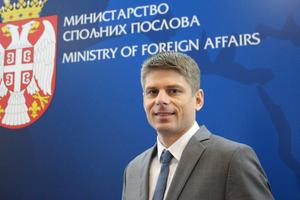Vatican Archbishop ‘Ultimately Very Optimistic’ About Catholic-Serbian Orthodox Relations
“We need to reinforce our identity above all as Christians and interpret history, the present, and the future in the light of the will of Christ. That is the thing that really matters.”

VATICAN CITY — The Vatican’s “foreign minister” has said that he is “ultimately very optimistic” about relations between Catholics and Serbian Orthodox Christians.
Archbishop Paul Gallagher made the remark during a visit to Serbia, a landlocked southeastern European country with a population of almost 7 million, around 85% of whom are Orthodox Christians.
The Vatican’s Secretary for Relations with States met with Porfirije, the patriarch of the Serbian Orthodox Church, on Nov. 23.
“That obviously is a good sign and we believe that there is a dialog that needs to go on and needs to go forward,” he told Ivan Tašev in an interview published on Nov. 25 in the Croatian Catholic weekly Glas Koncila (“Voice of the Council”).
“There is a history that needs to be challenged and confronted and I’m ultimately very optimistic. We view very positively the signs and the comments of the new patriarch and also I can say that the Holy Father has great respect and esteem for him and considers him already a brother within the universal Christian Church.”
Porfirije was elected leader of the Serbian Orthodox Church, an autocephalous Eastern Orthodox Church, in February during an assembly of bishops in the Serbian capital, Belgrade.
In an interview after his election, he raised concerns about the canonization cause of Bl. Aloysius Stepinac, who is considered a hero by Catholics in neighboring Croatia.
Archbishop Gallagher, who also visited Russia earlier this month, told Glas Koncila: “I think obviously there is a path to take, and that is the path of reconciliation. We need to obviously look at the shared history of the region.”
“We need to reinforce our identity above all as Christians and interpret history, the present, and the future in the light of the will of Christ. That is the thing that really matters.”
The 67-year-old English archbishop added: “There are a lot of other things such as wounds, there is contested history, and there are many other problems. In the end, what matters for the disciples of Christ is to do His will.”
No pope has visited Serbia, but Porfirije’s election raised hopes in Rome that Pope Francis might one day be invited to the country, where approximately 5% of the population is Catholic.
During a visit to Serbia in 2018, Cardinal Pietro Parolin, the Vatican Secretary of State, said that a papal visit could only take place “under the right conditions and when everyone agrees.”
- Keywords:
- serbian christians













